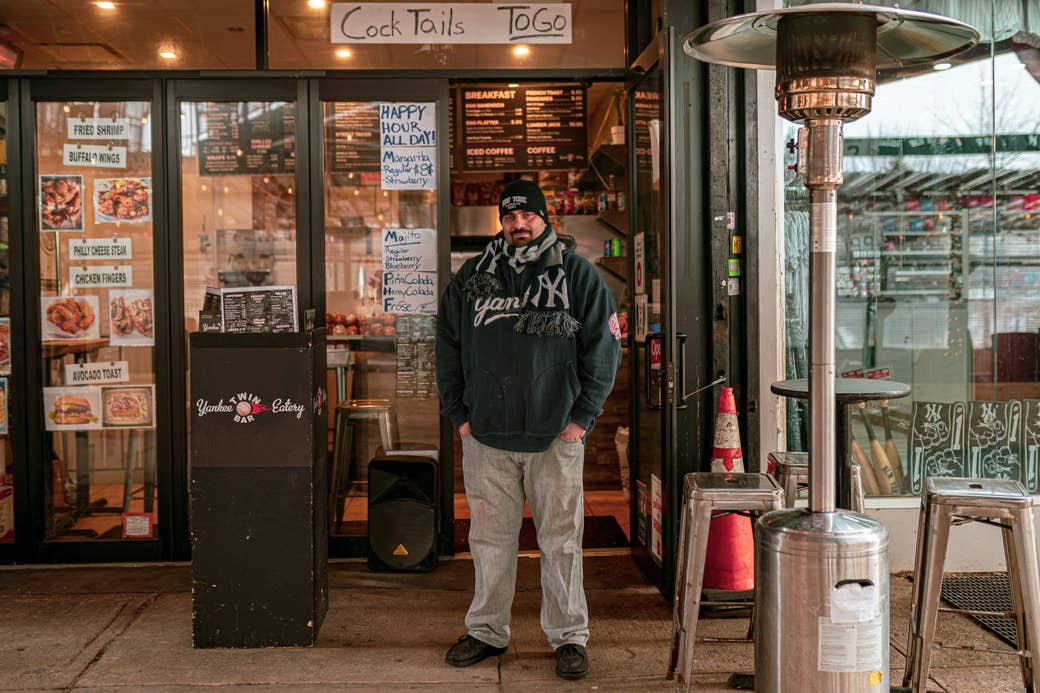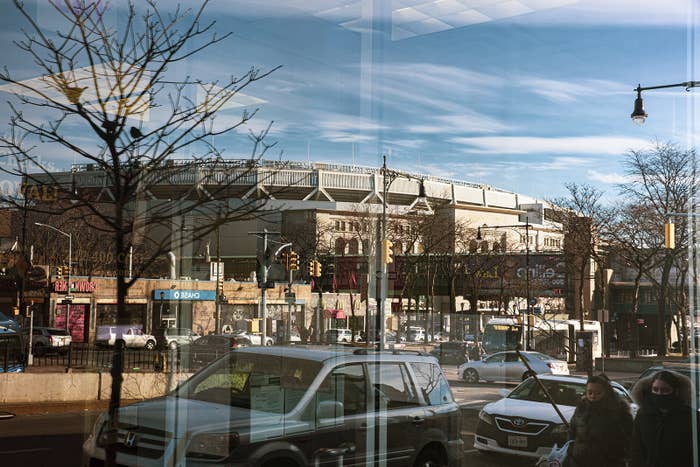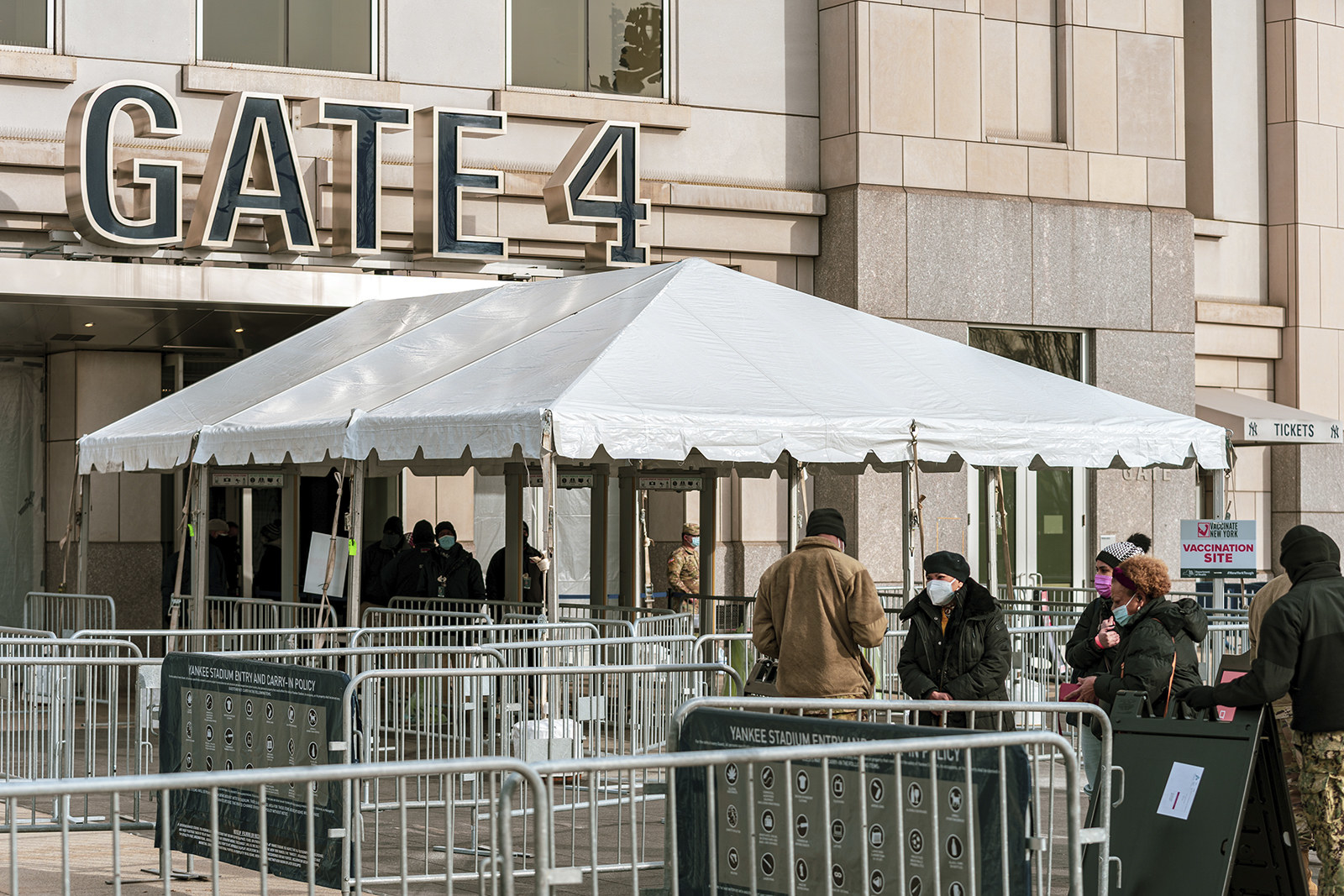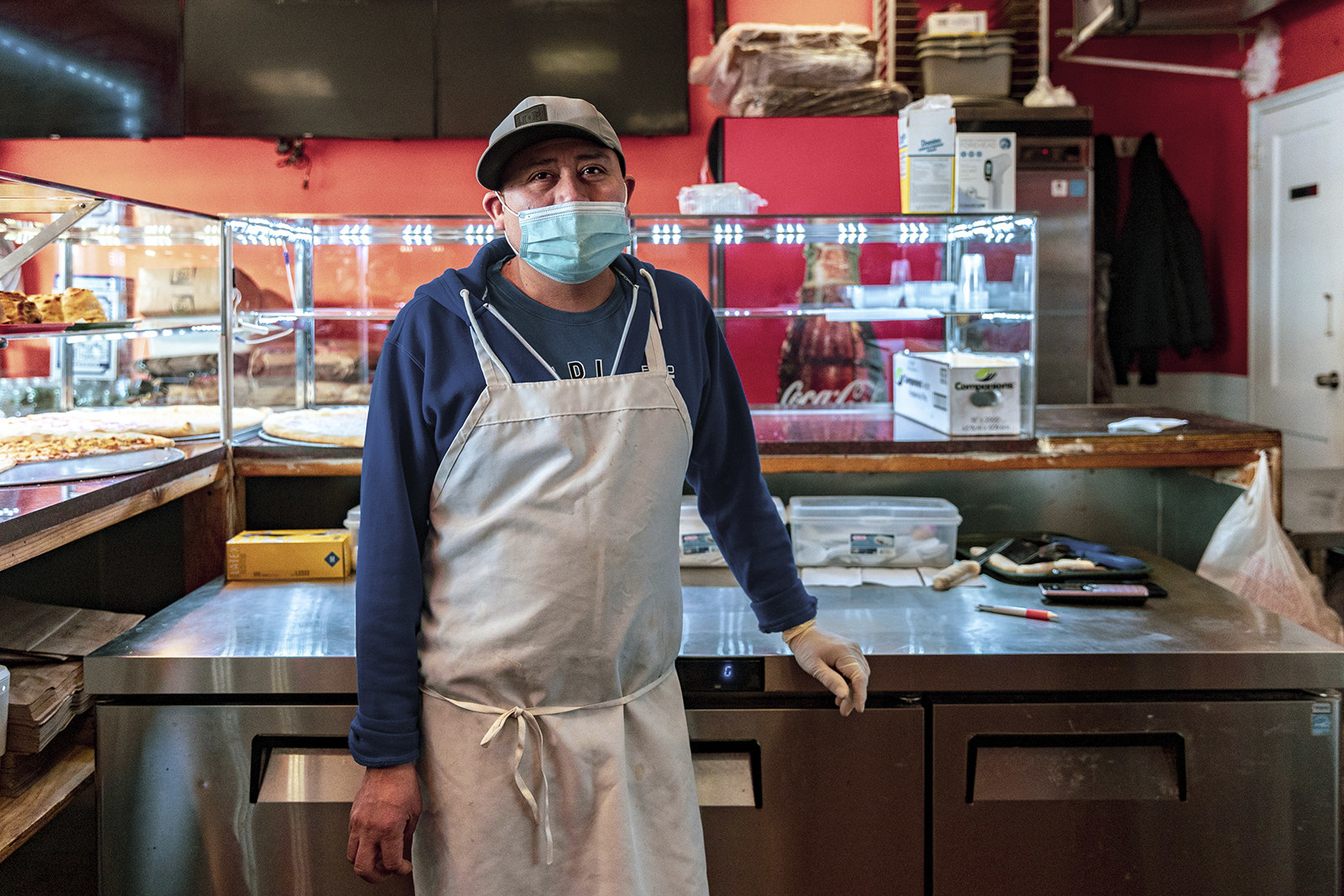
On Wednesday morning, more than two dozen Bronx residents stood in line at the gates of Yankee Stadium, hunkered against the cold wind as they awaited their turn to access one of the city’s largest vaccination sites.
Two blocks away, Antonio Cortez, a 42-year-old father of three wearing a red Yankees cap and a black mask, stood behind the counter of his restaurant, boxing up fried chicken and tostones for customers as he did every workday, hoping to avoid the coronavirus long enough to join the lucky ones who have made it inside the nearby stadium. He had signed up for a vaccine as soon as he learned about the site opening nearby, but his appointment wasn’t for another two weeks.
“There’s no appointments right now,” he said. “I will go to Yankee Stadium, but much later.”
Cortez was one of many essential workers in the blocks surrounding Bronx County’s largest vaccination site who had not been vaccinated. In Chinese restaurants, jerk chicken joints, grocery stores, and bodegas across the street, down the block, and around the corner from Yankee Stadium, food servers continue to clock in, interacting with a constant stream of customers without the protection of inoculation even as hundreds of people get their shots in the massive, columned sports facility looming over the neighborhood.
Only Bronx residents are eligible to access the mass vaccination site, which opened up earlier this month as a partnership between the city and state, and proof of residency is required for an appointment — part of a strategy to address the disparities in vaccination rates between whiter, wealthier residents and people of color with lower incomes in New York.

City data shows that white adults have been at least partially vaccinated — having gotten at least one of the two shots required for full inoculation for some vaccines — at more than twice the rate of Black and Latinx adults. About 3% of adults in the zip code of Yankee Stadium have been fully vaccinated so far, data shows, while it also suffered from a higher death rate from COVID-19 than the rest of the Bronx and New York City. Just six miles south, in the affluent Upper East Side, around 16% of adults have been fully vaccinated.
The Yankee Stadium site opened 15,000 vaccine appointments in its first week, and 13,000 slots were nabbed on the first day. “This is about protecting people who need the most protection because the Bronx is one of the places that bore the brunt of this crisis of the coronavirus,” Mayor Bill de Blasio said in remarks outside of the stadium on opening day. “The Bronx has suffered, but this is a place where the people of the Bronx will now be protected.”
As residents have signed up, the neighborhood's overall vaccination rate — counting adults who've received either one or two shots — has drawn closer to the citywide mark. But the number of people vaccinated at the site each day has dropped since the fanfare of its opening week, and many frontline workers in the neighborhood said they were still waiting on appointments or were not even sure if they qualified at all.
The Yankee Stadium site was vaccinating about 2,100 people a day in the first week, but now only about 1,000 people are being ushered through it for appointments, the governor’s office said. That’s about as many people as are being vaccinated at Jacob Javits Center in Manhattan, a mass vaccination site open to any New York resident.
With more than 10 million people eligible for the vaccine across the state, supply remains a challenge. On Thursday, the New York City Department of Health said it had 17,000 first doses of the vaccine available, even though it previously had been providing shots to as many as 30,000 people a day. The federal government ships new supplies at the beginning of each week, and the city said it expects another 169,000 doses next week.
As the coronavirus continues to impact communities of color at much higher rates, one of the questions that the city and the state must grapple with is where to disperse those doses when supplies are tight, appointments are quickly filling up, and millions more are becoming eligible for the vaccine. The city and state have so far declined to release data about how many doses have been administered at each vaccine site.
Though rows of barricades were set up outside the vaccination entrance to organize crowds Wednesday morning, by the afternoon the line had dwindled away, leaving the area largely empty except for the National Guard soldiers standing guard. A sign perched outside the entrance said that there were no appointments currently available. Several who had been able to get an appointment at the site said the process was efficient and they were in and out of Yankee Stadium quickly with their vaccination shot.
“I just saw that they were opening this up specifically for the Bronx, so I made an appointment,” said 78-year-old Yvonne Turner, her eyes tearing slightly in the cold, as wind chill temperatures were as low as 15 degrees. The process was smooth, she said, as she left the stadium with her first dose of the vaccine early Wednesday morning. “I had no problems.”
Just beyond the stadium, though, lots of essential workers who continue to show up each day still haven’t been able to schedule an appointment for themselves. They wear masks while stocking vegetables in the grocery store, serving hot slices of pizza, or bagging turkey sandwiches and sodas from the bodega — all while putting themselves at risk of still catching the coronavirus from their customers and bringing it home to their families.
Some in the Bronx, like Miguel Muñoz, who works at the Key Foods a couple of blocks from Yankee Stadium, have been eligible for weeks but still haven’t been vaccinated. Grocery store workers have been eligible since Jan. 11, but the earliest slot Muñoz could schedule was for the last week of February, leaving him anxious as he takes the subway five days a week to make his 8 a.m. shifts.
Thinking about his upcoming appointment later this month as he stocked a bin of sweet potatoes, Muñoz said he was excited.

People who work in customer-facing roles like grocery store workers are about five times more likely to catch the virus, according to a study published in the British Medical Journal. Some companies have enacted policies like pay raises to offset the exposure risks of going to work. And while a few companies have made those pay raises permanent, others, like Costco, Amazon, and Total Wine, quickly ended the pay increases, even as workers continue to face risks nearly a year into the pandemic.
In December, the mayor’s office initiated a vaccine equity plan targeting 27 neighborhoods that had been most affected by the pandemic with outreach through public housing complexes and virtual conversations to educate residents about how to get the vaccine.
“A vaccine must be distributed equally to be effective," de Blasio said in a December statement. “COVID-19 has exposed our city’s most painful disparities, and we are addressing those inequities head-on and making a vaccine available for all New Yorkers.”
At the end of January, the task force expanded its efforts to 33 neighborhoods and said that it would broaden its outreach and education efforts. But data released by the city also revealed that there remain huge racial disparities across New York City in who is receiving the vaccine.
The governor’s office said in a statement that it is working on closing this gap. “For months, Governor Cuomo has been highlighting the intolerable reality that New Yorkers of color are dying at higher rates than white New Yorkers — and he has been working to ensure vaccine distribution is equitable,” spokesperson Jack Sterne said, pointing to efforts like pop-up vaccine sites in public housing complexes and mass vaccination sites like Yankee Stadium.
“We are ready to get as many shots into arms as humanly possible, and as supply continues to increase under the Biden administration, we will make sure doses are available in every community statewide.”
But in a pizza shop just across the street from Yankee Stadium, Cupertino Vivar, its 42-year-old owner, said that while he wanted the vaccine, he didn’t know how to access it. “Can I walk over? Or I need a computer?” he asked. Focused on making pizzas from 10 a.m. to 8 p.m. every day, he hadn’t noticed the signs around the stadium informing locals about where to sign up for the vaccine. At a Chinese restaurant on the same block as the pizza shop, 31-year-old employee Randy Lin said that he wasn’t aware that he was eligible for the vaccine.

“I haven’t heard anything saying that restaurant workers are qualified,” he said. “Last time I heard, it was just people with health conditions can get it. That’s the recent one that I heard, but I haven’t heard anything after that.”
New York state has some of the broadest guidelines in the country for who is currently eligible for the vaccine. Yet compared with other states, it remains in the middle of the pack for percentage of doses administered, at 80%, according to data compiled from the CDC (the state disputes the CDC's numbers and said that it has distributed closer to 92% of its first doses, according to its vaccine tracker).
Access to information isn’t the only thing keeping some Bronx residents from Yankee Stadium. Some who spoke to BuzzFeed News said that they were wary of vaccines that were developed so quickly under the oversight of a government that has stumbled at every step throughout the pandemic. “Of course I’m worried about COVID,” said 34-year old Sam Saleh, who manages one of the bodegas near the stadium. With most of his family back in Egypt, where he believes they are safer from COVID than they would be in New York, he said he wants to wait a few more months. “I’m waiting to see how people react to it, and then I’ll give it a try,” Saleh said.
But for those who have managed to get the vaccine, daily routines that have felt perilous for so long feel suddenly, mercifully, safer again. Joseph Michialis, whose family runs Yankee Twin Eatery Bar across the street from the stadium, recently got his first dose of the vaccine. Born in the Bronx and a die-hard fan decked out in a Yankees jacket, hat, and scarf, he said he kept his restaurant open to serve meals to the first responders when the stadium was used as a staging ground for ambulances last spring.
When the stadium became a vaccination site, Michialis said, one of the people running the appointments made sure to offer him one. He jumped at the chance. “My mother is asthmatic, number one, and I wanna horse around with my cousins, my uncles, and horse around with them the way I used to do it,” he said.
He keeps his vaccine card in the cash register, proud to show it off. ●
